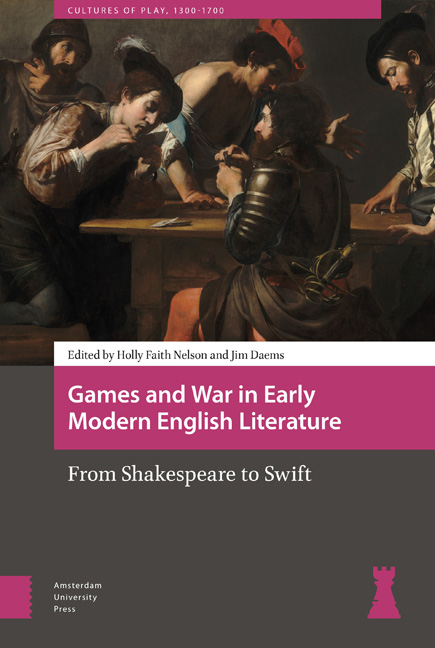Book contents
- Frontmatter
- Dedication
- Contents
- Acknowledgements
- The Interplay of Games and War in Early Modern English Literature: An Introduction
- 1 ‘Can this cock-pit hold the vasty fields of France?’ Cock-Fighting and the Representation of War in Shakespeare’s Henry V
- 2 Game Over: Play and War in Shakespeare’s Troilus and Cressida
- 3 Thomas Morton’s Maypole: Revels, War Games, and Transatlantic Conflict
- 4 Milton’s Epic Games: War and Recreation in Paradise Lost
- 5 Ciphers and Gaming for Pleasure and War
- 6 Virtual Reality, Role Play, and World-Building in Margaret Cavendish’s Literary War Games
- 7 Dice, Jesting, and the ‘Pleasing Delusion’ of Warlike Love in Aphra Behn’s The Luckey Chance
- 8 War and Games in Swift’s Battle of the Books and Gulliver’s Travels
- 9 Time-Servers, Turncoats, and the Hostile Reprint: Considering the Conflict of a Paper War
- Index
6 - Virtual Reality, Role Play, and World-Building in Margaret Cavendish’s Literary War Games
Published online by Cambridge University Press: 21 November 2020
- Frontmatter
- Dedication
- Contents
- Acknowledgements
- The Interplay of Games and War in Early Modern English Literature: An Introduction
- 1 ‘Can this cock-pit hold the vasty fields of France?’ Cock-Fighting and the Representation of War in Shakespeare’s Henry V
- 2 Game Over: Play and War in Shakespeare’s Troilus and Cressida
- 3 Thomas Morton’s Maypole: Revels, War Games, and Transatlantic Conflict
- 4 Milton’s Epic Games: War and Recreation in Paradise Lost
- 5 Ciphers and Gaming for Pleasure and War
- 6 Virtual Reality, Role Play, and World-Building in Margaret Cavendish’s Literary War Games
- 7 Dice, Jesting, and the ‘Pleasing Delusion’ of Warlike Love in Aphra Behn’s The Luckey Chance
- 8 War and Games in Swift’s Battle of the Books and Gulliver’s Travels
- 9 Time-Servers, Turncoats, and the Hostile Reprint: Considering the Conflict of a Paper War
- Index
Summary
Abstract
Margaret Cavendish repeatedly creates alternative or virtual worlds at war in which she participates as a military agent through her avatars; in so doing, Cavendish works through the trauma of her own experience of civil war. While Cavendish was critical of many contemporary tabletop and physical games, she embraced cerebral gameplay in such a way as to produce literary war games that anticipate key aspects of Role Playing Games (RPGs). The nature and operation of the military avatars in her ‘thought experiments’ challenge existing theories on the history of women and war-gaming.
Keywords: Cavendish's The Blazing World; Cavendish's Bell in Campo; game theory and early modern literature; Cavendish and cerebral gaming
At the conclusion of her Philosophical and Physical Opinions, Margaret Cavendish inserts the brief philosophical musings of her husband, William Cavendish, under the title ‘His Excellency The Lord Marquis of Newcastle His Opinion concerning the Ground of Natural Philosophy’. William prefaces his thoughts with the claim that the field of natural philosophy is characterized by little more than guess-work, allowing anyone to contribute:
Since now it is A-la-mode to Write of Natural Philosophy, and I know, no body Knows what is the Cause of any thing, and since they are all but Guessers, not Knowing, it gives every Man room to Think what he likes, and so I mean to Set up for my self, and Play at this Philosophical Game […] with-out Patching or Stealing from any Body.
Margaret Cavendish is as inclined as her husband to dedicate herself to such mental guessing games or what we might call ‘cerebral gaming’. And for Cavendish, as Sylvia Bowerbank, Lisa T. Sarasohn, and Anne M. Thell (among others) have shown, it is perfectly acceptable to merge fanciful imaginings and rational theoretical work in playing such games. Maura Smyth has recently explored in Women Writing Fancy Cavendish's awareness of the ‘power’ of ‘fancy’, or mental gameplay, to grant her ‘a world-making capacity’, given that fancy was understood at the time as ‘the process, and the faculty, of forming mental representations of things not present to the senses’.
- Type
- Chapter
- Information
- Games and War in Early Modern English LiteratureFrom Shakespeare to Swift, pp. 117 - 138Publisher: Amsterdam University PressPrint publication year: 2019

